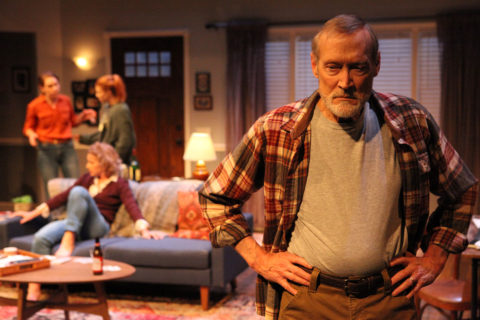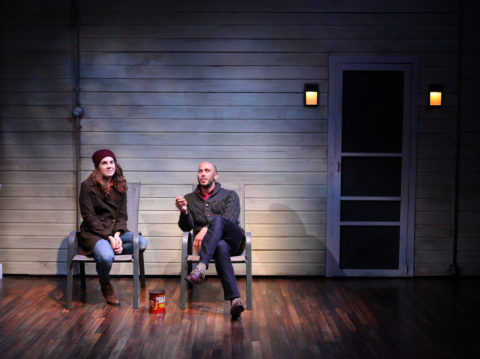
James Carpenter in THE RESTING PLACE. Photo: Jennifer Reiley
“Enjoy the rest of the show!” said the concessionaire, handing a matronly audience member her glass of wine during intermission at Magic Theatre’s production of “The Resting Place.”
“Well,” said the woman, pausing for a long moment, “‘enjoy’ isn’t exactly the right word.”
This world-premiere family drama by Ashlin Halfnight, developed through Magic’s own Virgin Play Festival, touches on suicide, homosexuality and pedophilia. Those three words, spoken in tandem, will strike many in the queer community as inherently repugnant. For too many years of theater, television and film, the first was standard fate for characters inclined to the second, and often by default assumed to engage in the third.
Not to worry. Maybe not quite to “enjoy,” either. But if you find “Law & Order: SVU” compelling, you can handle “The Resting Place,” which, along with delivering a compelling psychological exploration of its characters, eagerly dismantles nasty stereotypes — not just the trope of gay men being pedophiles, but also the one about middle-class, small-town Americans being homophobes.
Halfnight’s sturdy, realistic play is largely set in a middle-class home in suburban Detroit where father Mitch, mother Angela, and their grown daughters Annie and Macy, in from their respective homes in San Francisco and New York, have gathered to grieve the suicide of their eldest son and sibling, Travis.
We quickly learn that Travis’ torment stemmed from the consuming pedophilic impulses that led him to amass hordes of child pornography. and rape over a dozen boys over the course of many years. Ashamed of himself and unable to openly acknowledge his illness, Travis led his secret life in parallel with a benevolent quotidian existence, in which he served as middle sister Annie’s guide to nature and outdoorsmanship, a dedicated science teacher to his students, and a loving partner to his one-time boyfriend, Liam. How such a man should be — and can be — remembered is the crux of the play.

Martha Brigham and Wiley Naman Strasser. Photo: Jennifer Reiley
The unquestionably warm rapport between Travis’ surviving family and tender, bewildered Liam (Wiley Naman Strasser, in a quiet, enormously difficult and utterly believable performance) demonstrates Halfnight’s deeply empathetic approach to his characters. But rest assured, this empathy doesn’t only express itself in comfort and reconciliation.
It also plays out in several ferocious, genuinely frightening tirades from soulful, shattered Mitch (James Carpenter, nailing the play’s most complex array of emotions). In one, he lashes out at Annie — who wants to focus only on her brother’s positive qualities — explaining how betrayed he feels after all the earnest effort he and Angela (Emilie Talbot) put into urging their small, Catholic community to accept and trust Travis when he first came out as gay.
Annie, a San Francisco conservation activist who feels more of a connection to her late brother than to her parents, is intended to be the play’s central character. But Martha Brigham plays the character as so stone-cold and self-enclosed that her doctrinaire speechifying and appalling disrespect for her grieving parents push her out to the margins of the audience’s concern. We shouldn’t feel more engaged by an offstage dead man than by the leading lady.
Still, “The Resting Place” is well-worth seeing for challenging both its characters and audience to find compassion and connection amidst rage and bewilderment. “Compassion” — that’s exactly the right word.
Originally published in the Bay Area Reporter
